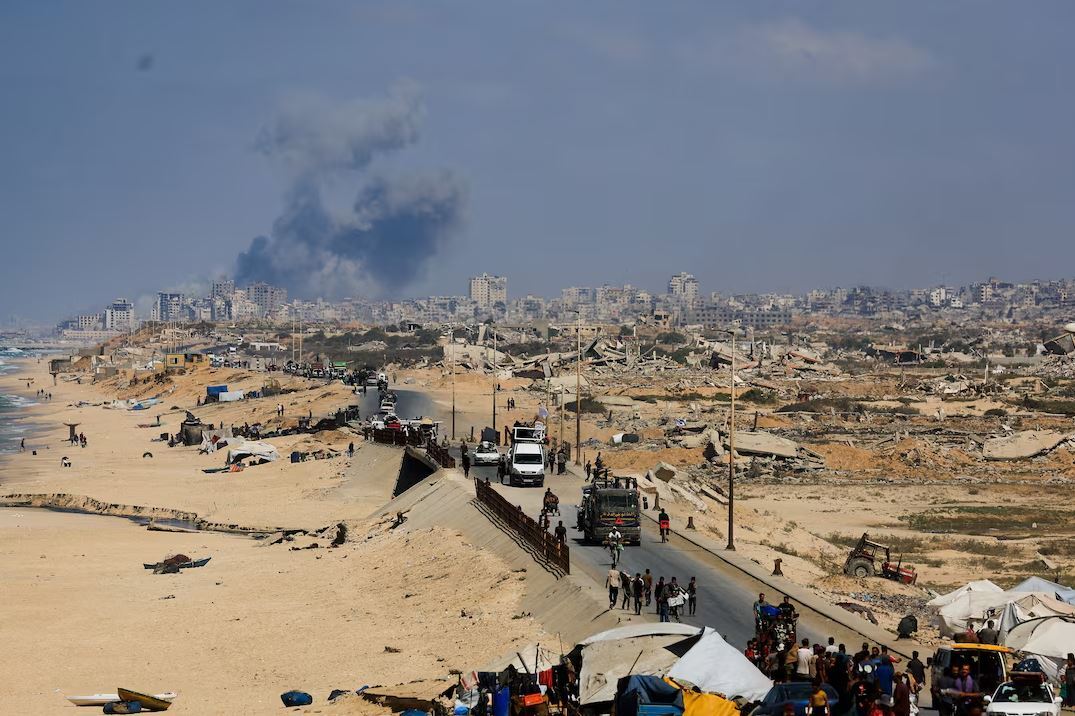Without Palestinians at the Table, Trump’s Gaza Plan Has a ‘Fundamental Weakness’: Analyst

The White House unveiled the initiative in Washington on Monday, following talks between US President Donald Trump and Israeli prime minister Benjamin Netanyahu. The plan promises a phased Israeli withdrawal from Gaza once Hamas is disarmed, the release of captives, and the stationing of international or Arab peacekeeping forces.
But Hossein Ajorloo, a Tehran-based political analyst, says the design of the proposal exposes its fragility from the start. “The main weakness of this plan is that it excludes the very party at the heart of the conflict — the Palestinians. It is an agreement written without the presence of those it is supposed to govern,” he told IQNA in an interview.
According to Ajorloo, the absence of a Palestinian voice undermines the proposal’s legitimacy. “There is no place for Palestinians in the structure of this plan, not even through the Palestinian Authority,” he said.
Instead, the framework emphasizes Western-Arab or Arab-Islamic arrangements, which he called a “serious Achilles’ heel.”
The analyst added that even if the plan contained promising elements, the record of past peace efforts leaves little hope. “Experience shows the Israeli side has not abided by previous agreements, from Oslo onward. The United States was supposed to guarantee implementation but has consistently failed to hold Israel accountable,” he said.
Read More:
The 20-point plan includes provisions for a 72-hour deadline for prisoner releases and calls for demilitarization of Gaza. But Ajorloo questioned how such steps would be enforced.
“Who is the referee of this plan? If it is the United States, then history tells us clearly it cannot be impartial. There is no mechanism in the text that secures permanent withdrawal or monitors compliance,” he argued.
He pointed to Israel’s record of breaking ceasefires and continuing settlement expansion in the West Bank as signs that enforcement cannot be taken for granted. “Even when Israel has violated agreements, Washington has stood by its side. That alone shows why this plan suffers from a structural weakness,” he added.
Beyond enforcement, Ajorloo highlighted gaps in defining Gaza’s political future. “The plan is vague on what kind of governance will be established. Who will run security? Who will take political responsibility? Naming figures like [Former UK Prime Minister] Tony Blair and envisioning Gaza as a trade zone does not answer these fundamental questions,” he said.
The plan stipulates the disarmament and dismantling of Hamas and other armed groups such as Islamic Jihad. Ajorloo doubted the feasibility of such demands. “Hamas and other resistance groups are deeply rooted in Gaza’s social and political structure. To imagine their complete disarmament and disappearance is unrealistic,” he said.
Read More:
Still, he noted there are incentives that could tempt Hamas to consider aspects of the plan. “A guarantee against forced displacement and the promise of a permanent ceasefire are issues of real importance for Palestinians. If those points were credible, they could reduce suffering and appeal to Hamas,” he said.
But he stressed that Hamas would not compromise its red lines. “Handing over weapons without solid guarantees is unacceptable. Leaving governance undefined risks Palestinian infighting. And large parts of this plan exist only on paper. These are reasons Hamas is unlikely to agree.”
The Israeli genocidal war on Gaza is entering its second year, with more than 66,000 Palestinians killed and at least 167,000 injured since Israel launched its onslaught in October 2023. Entire neighborhoods have been leveled, and the humanitarian situation remains dire.
Ajorloo argued that the war itself has altered realities on the ground. “Two years of resistance have blocked Israel’s grand strategy of annexing Gaza and displacing its population. That in itself is an achievement for Palestinians,” he said.
He added that while the proposal makes reference to preventing displacement and nods to a two-state framework, it stops short of granting Palestinians full recognition or sovereignty. “For Palestinians, legitimacy requires a clear, official place in the plan. Without that, this initiative cannot succeed,” he said.
Read More:
Looking ahead, Ajorloo suggested that any viable peace must emerge from within the region rather than being imposed by outside powers. “Successful plans are those in which the main regional players design and support the framework, and then seek international backing,” he said. By contrast, US-drafted initiatives often prioritize Israeli interests, he argued, fueling further conflict rather than resolving it.
“Agreements like the Abraham Accords may create temporary calm or even limited stability,” he said, “but they cannot solve the core problems because they ignore the fundamental realities of the region.”
For now, the future remains uncertain. “Unfortunately, the plans proposed by the United States rarely align with regional realities. Just as Oslo failed, this plan is unlikely to succeed because it contradicts the balance of power and the lived realities of Palestinians,” Ajorloo said.
He noted that until Palestinians are recognized as central actors and credible enforcement mechanisms are put in place, “peace plans will remain paper agreements with little hope of lasting impact.”
4307993



